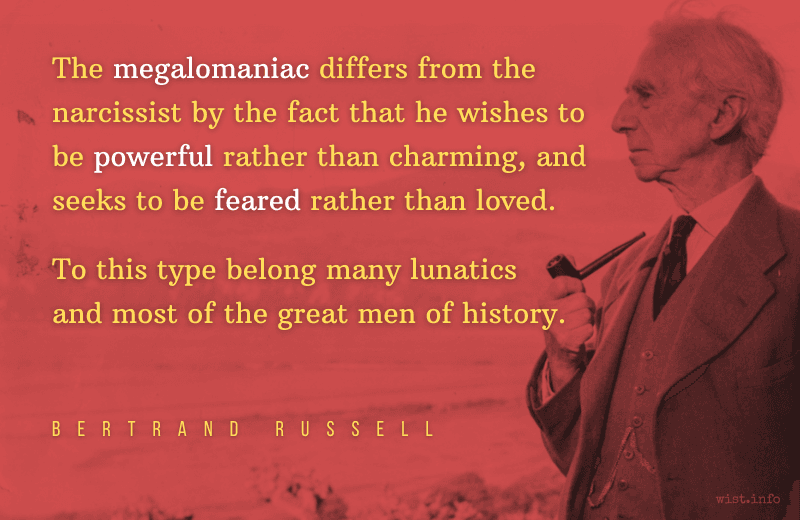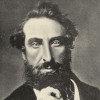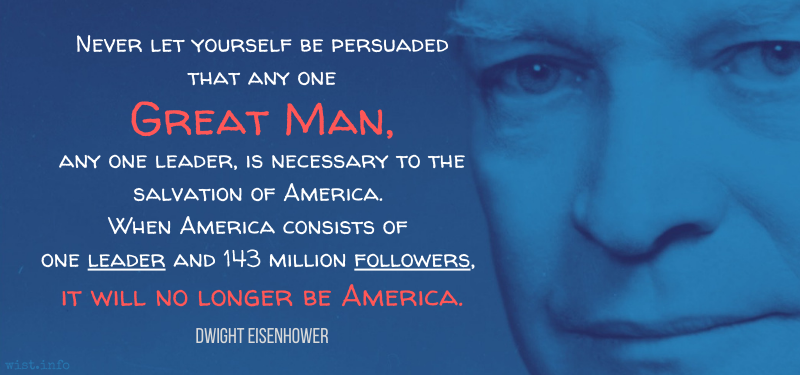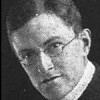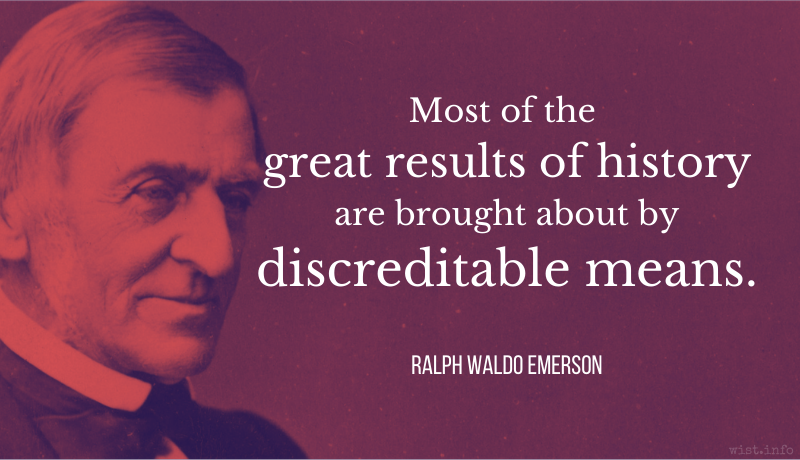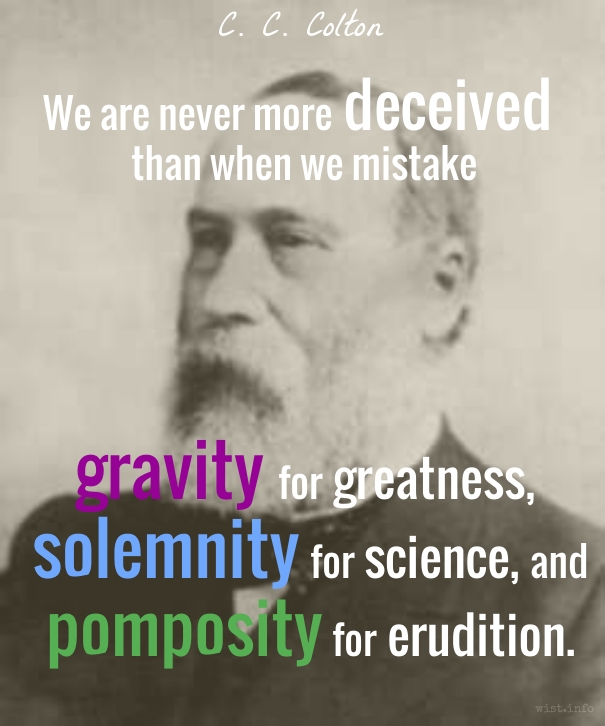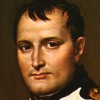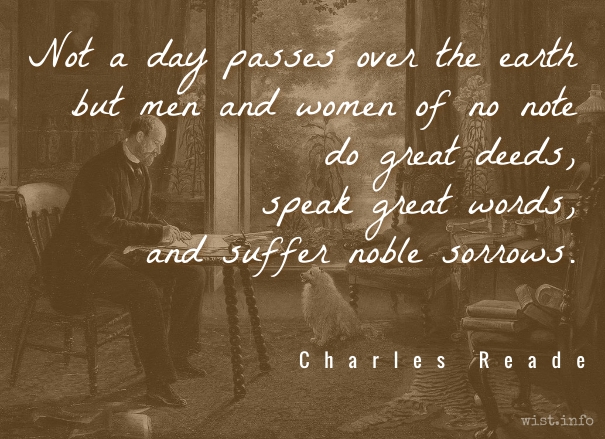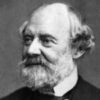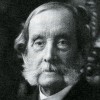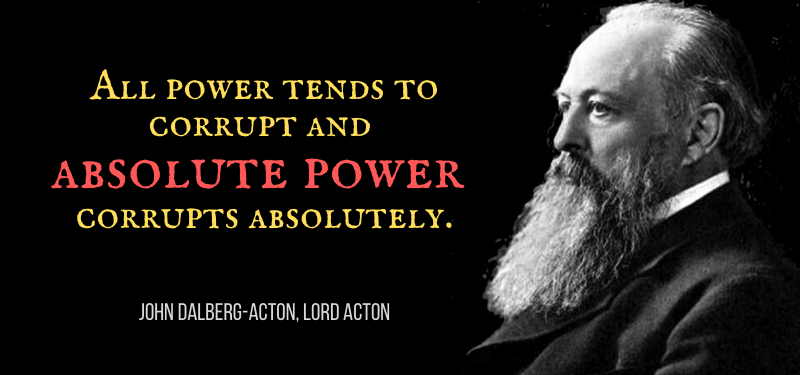SGANARELLE: But when a great lord is a wicked man, it is a terrible thing.
[Mais un grand seigneur méchant homme est une terrible chose.]
Molière (1622-1673) French playwright, actor [stage name for Jean-Baptiste Poquelin]
Don Juan [Dom Juan], Act 1, sc. 1 (1665) [tr. Waller (1904)]
(Source)
(Source (French)). Other translations:But a great Lord, a wicked Man, is a terrible thing.
[tr. Clitandre (1672)]If a great lord is a wicked man it is a terrible thing.
[tr. Van Laun (1876)]But if a great lord is also a wicked man, it is a terrible thing.
[tr. Wall (1879)]But a wicked nobleman is a terrible thing.
[tr. Page (1908)]But a great lord who is a wicked man is a terrible thing.
[tr. Frame (1967)]But a wicked nobleman is a frightening master.
[tr. Bermel (1987)]But a great lord who's a wicked man is a frightening thing.
[tr. Wilbur (2001)]
Sometimes rendered "What a terrible thing to be a great lord, yet a wicked man," though I could not find a good source for that phrasing, which is also attributed to Carlos Castañeda.
Quotations about:
greatness
Note not all quotations have been tagged, so Search may find additional quotes on this topic.
Hero-worship exists, has existed, and will forever exist, universally among mankind.
Thomas Carlyle (1795-1881) Scottish essayist and historian
Sartor Resartus, Book 3, ch. 7 (1834)
(Source)
Quoting Herr Teufelsdröckh.
This passage first appeared in Fraser's Magazine for Town and Country, Vol. 10, No. 55 (1834-07).
It is difficult to think of any politician who has lived to be eighty and still been regarded as a success. What we call a “great” statesman normally means one who dies before his policy has had time to take effect. If Cromwell had lived a few years longer he would probably have fallen from power, in which case we should now regard him as a failure. If Pétain had died in 1930, France would have venerated him as a hero and patriot. Napoleon remarked once that if only a cannon-ball had happened to hit him when he was riding into Moscow, he would have gone down to history as the greatest man who ever lived.
George Orwell (1903-1950) English writer [pseud. of Eric Arthur Blair]
Essay (1946-05), “Second Thoughts on James Burnham,” Polemic Magazine
(Source)
Published separately as a pamphlet, James Burnham and the Managerial Revolution (1946).
Cheerfullness makes the plainest features butiful, the severest winter agreeable; it elevates the lowly, and adds a charm tew grateness, all its own.
[Cheerfulness makes the plainest features beautiful, the severest winter agreeable; it elevates the lowly, and adds a charm to greatness.]
Josh Billings (1818-1885) American humorist, aphorist [pseud. of Henry Wheeler Shaw]
Everybody’s Friend, Or; Josh Billing’s Encyclopedia and Proverbial Philosophy of Wit and Humor, ch. 281 “Variety: Bred and Butter” (1874)
(Source)
This haz alwus bin the rule, and alwus will be — no man iz grate unless he iz good.
[This has always been the rule, and always will be — no man is great unless he is good.]
Josh Billings (1818-1885) American humorist, aphorist [pseud. of Henry Wheeler Shaw]
Everybody’s Friend, Or; Josh Billing’s Encyclopedia and Proverbial Philosophy of Wit and Humor, ch. 281 “Variety: Bred and Butter” (1874)
(Source)
“Censure,” says a late ingenious author, “is the tax a man pays for being eminent.” It is a folly for an eminent man to think of escaping it, and a weakness to be affected with it. All the illustrious persons of antiquity, and indeed of every age in the world, have passed through this fiery persecution. There is no defense against reproach but obscurity; it is a kind of concomitant to greatness, as satires and invectives were an essential part of a Roman triumph.
Joseph Addison (1672-1719) English essayist, poet, statesman
Essay (1711-06-26), The Spectator, No. 101
(Source)
The quotation is from Jonathan Swift.
I have always been looking for the noble qualities in human beings, and I have found them. There are great souls all along the highway of life, and there are great qualities even in the people who seem common and weak to us ordinarily.
Ella Wheeler Wilcox (1850-1919) American author, poet, temperance advocate, spiritualist
Essay (1902), “A Worn Out Creed,” Heart of the New Thought
(Source)
All greatness is unconscious, or it is little and naught.
Thomas Carlyle (1795-1881) Scottish essayist and historian
Essay (1837-12-06), “On Sir Walter Scott,” The London and Westminster Review, No. 12/55, Art. 2 (1838-01)
(Source)
Review of J. G. Lockhart, Memoirs of the Life of Sir Walter Scott, Baronet, 6 vols. (1837). Collected in Carlyle, Critical and Miscellaneous Essays (1827-1855).
The megalomaniac differs from the narcissist by the fact that he wishes to be powerful rather than charming, and seeks to be feared rather than loved. To this type belong many lunatics and most of the great men of history.
Bertrand Russell (1872-1970) English mathematician and philosopher
Conquest of Happiness, Part 1, ch. 1 “What Makes People Unhappy?” (1930)
(Source)
The nearer we approach great men, the clearer we see that they are men. Barely do they appear great before their valets.
[Rarement ils sont grands vis-à-vis de leurs valets-de-chambre.]
Jean de La Bruyère (1645-1696) French essayist, moralist
(Spurious)
This passage, both English and French, is attributed to La Bruyere (and, more specifically, to his Characters [Les Caractères] (1688). It does not, however, appear in that work (in any translation or the native French) nor does it seem to appear in any other work of La Bruyere that I could find.
Both English and French show up in a passage in Samuel Arthur Bent, Short Sayings of Great Men (1882), about Mme. de Cornuel (d. 1694). Bent is discussing a quotation attributed to her, with parallels amongst Montaigne (1586) and Goethe (1805). (The passage is quoted at Bartleby.com, which may account for modern familiarity with it.) Bent cites the above from La Bruyere's Caractères.
Other versions, of each sentence, show up in quotations collections over the following decades, and today the French has a number of hits on Russian/Slavic websites, but nothing (not even on French search engines) that pins it to any source aside from the same pages in English language searches.
The world’s great men have not commonly been great scholars, nor great scholars great men.
My friend, brag not yet of our American cousins! Their quantity of cotton, dollars, industry and resources, I believe to be almost unspeakable; but I can by no means worship the like of these. What great human soul, what great thought, what great noble thing that one could worship, or loyally admire, has yet been produced there? None: the American cousins have yet done none of these things.
Thomas Carlyle (1795-1881) Scottish essayist and historian
Essay (1850-02-01), “The Present Time,” Latter-Day Pamphlets, No. 1
(Source)
He that can take rest is greater than he that can take cities.
Benjamin Franklin (1706-1790) American statesman, scientist, philosopher, aphorist
Poor Richard (1737 ed.)
(Source)
Not every great man is a great human being.
[Nicht jeder große Mann is ein großer Mensch.]
Marie von Ebner-Eschenbach (1830-1916) Austrian writer
Aphorisms [Aphorismen], No. 267 (1880) [tr. Scrase/Mieder (1994)]
(Source)
(Source (German)). Alternate translation:Not every great man is a grand human being.
[tr. Wister (1883)]
False greatness is unsociable and inaccessible; as it is sensible of its weakness, it conceals itself, or at least does not show itself openly, and only allows just so much to be seen as will carry on the deceit, so as not to appear what it really is, namely, undoubtedly mean. True greatness, on the contrary, is free, gentle, familiar, and popular; it allows itself to be touched and handled, loses nothing by being seen closely, and is the more admired the better it is known.
[La fausse grandeur est farouche et inaccessible: comme elle sent son faible, elle se cache, ou du moins ne se montre pas de front, et ne se fait voir qu’autant qu’il faut pour imposer et ne paraître point ce qu’elle est, je veux dire une vraie petitesse. La véritable grandeur est libre, douce, familière, populaire; elle se laisse toucher et manier, elle ne perd rien à être vue de près; plus on la connaît, plus on l’admire.]Jean de La Bruyère (1645-1696) French essayist, moralist
The Characters [Les Caractères], ch. 2 “Of Personal Merit [Du Mérite Personnel],” § 42 (2.42) (1688) [tr. Van Laun (1885)]
(Source)
(Source (French)). Alternate translations:False Greatness is unsociable, inaccessible, as if 'twere sensible of its weakness, and strove to conceal it. 'Twill not be seen, except just so much, as may carry on the Deceit, but dares not shew its Face for fear of being discover'd: Discover'd how really little and mean it is. True Greatness, on the contrary, is free, complaisant, familiar, popular, suffers it self to be touch'd and handl'd, loses nothing by being view'd near at hand, is rather more known and admir'd for it.
[Bullord ed. (1696)]False greatness is unsociable and remote: conscious of its own frailty, it hides, or at least averts its face, and reveals itself only enough to create an illusion and not be recognized as the meanness that it really is. True greatness is free, kind, familiar and popular; it lets itself be touched and handled, it loses nothing by being seen at close quarters; the better one knows it, the more one admires it.
[tr. Stewart (1970)]
He is her glory. Any woman could say it. For every one of them, God is in her child. Mothers of great men must have been familiar with this feeling, but then, all women are mothers of great men — it isn’t their fault if life disappoints them later.
Boris Pasternak (1890-1960) Russian poet, novelist, and literary translator
Doctor Zhivago [До́ктор Жива́го], Part 2, ch. 9 “Varykino,” sec. 3 [Yury] (1955) [tr. Hayward & Harari (1958), US ed.]
(Source)
Comparing all motherhood to that of Mary toward Jesus.
Alternate translations:He is her glory. Any woman could say it. For every one of them, God is in her child. Mothers of great men must have this feeling particularly, but then, at the beginning, all women are mothers of great men -- it isn’t their fault if life disappoints them later.
[tr. Hayward & Harari (1958), UK ed.]He is her glory. Every woman can say the same. Her god is in her child. Mothers of great people should be familiar with that feeling. But decidedly all mothers are mothers of great people, and it is not their fault that life later disappoints them.
[tr. Pevear & Volokhonsky (2010)]
Never get a reputation for a small perfection, if you are trying for fame in a loftier area; the world can only judge by generals, and it sees that those who pay considerable attention to minutiæ, seldom have their minds occupied with great things. There are, it is true, exceptions; but to exceptions the world does not attend.
Edward George Bulwer-Lytton (1803-1873) English novelist and politician
The Disowned, ch. 2 [Talbot] (1828)
(Source)
See La Rochefoucauld.
Focusing your life solely on making a buck shows a certain poverty of ambition. It asks too little of yourself. You need to take up the challenges that we face as a nation and make them your own. Not because you have a debt to those who helped you get here, although you do have that debt. Not because you have an obligation to those who are less fortunate than you, although I do think you do have that obligation. It’s primarily because you have an obligation to yourself. Because individual salvation has always depended on collective salvation. Because it’s only when you hitch your wagon to something larger than yourself that you realize your true potential.
Barack Obama (b. 1961) American politician, US President (2009-2017)
Speech (2005-06-04), Commencement, Knox College, Galesburg, Illinois
(Source)
People who are too much concerned with little things usually become incapable of big ones.
[Ceux qui s’appliquent trop aux petites choses deviennent ordinairement incapables des grandes.]François VI, duc de La Rochefoucauld (1613-1680) French epigrammatist, memoirist, noble
Réflexions ou sentences et maximes morales [Reflections; or Sentences and Moral Maxims], ¶41 (1665-1678) [tr. Kronenberger (1959)]
(Source)
Present from the 1665 edition. See here for more discussion (English).
(Source (French)). Alternate translations:They that use to employ their minds too much upon Trifles, commonly make themselves incapable of any thing that is serious or great.
[tr. Stanhope (1694), ¶42]Those who apply themselves too much to little things, commonly become incapable of great ones.
[pub. Donaldson (1783), ¶38; ed. Lepoittevin-Lacroix (1797), ¶41]]Those who apply themselves much to little things, commonly become incapable of great ones.
[ed. Carville (1835), ¶35]Those who bestow too much application on trifling things, become generally incapable of great ones.
[ed. Gowens (1851), ¶42]Those who apply themselves too closely to little things often become incapable of great things.
[tr. Bund/Friswell (1871)]Undue attention to details tends to unfit us for greater enterprises.
[tr. Heard (1917)]Too close attention to trifles generally breeds incapacity in matters of moment.
[tr. Stevens (1939)]Men too involved in details usually become unable to deal with great matters.
[tr. FitzGibbon (1957)]People too much taken up with little things usually become incapable of big ones.
[tr. Tancock (1959)]Those who apply themselves too much to little things, ordinarily become incapable of great ones.
[tr. Whichello (2016)]
It’s great to be great but it’s great to be human.
There have been as great Souls unknown to fame as any of the most famous.
Benjamin Franklin (1706-1790) American statesman, scientist, philosopher, aphorist
Poor Richard (1734 ed.)
(Source)
Do not let us speak of darker days: let us speak rather of sterner days. These are not dark days; these are great days — the greatest days our country has ever lived; and we must all thank God that we have been allowed, each of us according to our stations, to play a part in making these days memorable in the history of our race.
Winston Churchill (1874-1965) British statesman and author
Speech, Harrow School, England (1941-10-29)
(Source)
AHASUERAS: I am content.
ESTHER: Content is not the pathway to great deeds.
Ella Wheeler Wilcox (1850-1919) American author, poet, temperance advocate, spiritualist
Poem (1909), “The Drama of Mizpah: Honeymoon Scene,” Poems of Progress
(Source)
No man is great if he thinks he is.
A plain appearance is to ordinary men their proper garb: it suits them and fits them, but it adorns those persons whose lives have been distinguished by grand deeds; I compare them to a beauty who is most charming in négligé.
[Un extérieur simple est l’habit des hommes vulgaires, il est taillé pour eux et sur leur mesure; mais c’est une parure pour ceux qui ont rempli leur vie de grandes actions: je les compare à une beauté négligée, mais plus piquante.]
Jean de La Bruyère (1645-1696) French essayist, moralist
The Characters [Les Caractères], ch. 2 “Of Personal Merit [Du Mérite Personnel],” § 17 (2.17) (1688) [tr. Van Laun (1885)]
(Source)
(Source (French)). Alternate translations:That Simplicity of outward Appearance, which in vulgar Men seems to be their proper Clothes, shap'd and fitted to their Size, is the ornamental Habit of those Persons whose Lives have been full of great Actions. I compare 'em to a Beauty, that is more charming for being negligent.
[Curll ed. (1713)]A plain Exterior is to ordinary Men their proper Garb, shaped and fitted to their Size, but is an ornamental Habit in those Persons whose Lives have been distinguished by signal Actions. I compare them to a Beauty, most charming when à la negligé.
[Browne ed. (1752)]Outward simplicity befits ordinary men, like a garment made to measure for them; but it serves as an adornment to those who have filled their lives with great deeds: they might be compared to some beauty carelessly dressed and thereby all the more attractive.
[tr. Stewart (1970)]
The root of human virtue seldom bears
Like branches; and the Giver wills it so,
That men may know it is His gift, not theirs.
[Rade volte risurge per li rami
l’umana probitate; e questo vole
quei che la dà, perché da lui si chiami.]Dante Alighieri (1265-1321) Italian poet
The Divine Comedy [Divina Commedia], Book 2 “Purgatorio,” Canto 7, l. 121ff (7.121-123) (1314) [tr. Sayers (1955)]
(Source)
Dante noting that the sons of great kings rarely measure up to their fathers, a reminder from God that those who would be great must seek His blessing, not rely on their heritage.
(Source (Italian)). Alternate translations:Rarely into the branches of the tree
Doth human worth mount up; and so ordains
He who bestows it, that as his free gift
It may be call’d.
[tr. Cary (1814)]Rarely shoots merit up into the boughs,
Or human worth; and such the will of Him,
That from the Donor they should seem to come.
[tr. Bannerman (1850)]Not oftentimes upriseth through the branches
The probity of man; and this He wills
Who gives it, so that we may ask of Him.
[tr. Longfellow (1867)]Seldom rises human goodness through the branches; and this wills He who gives it in order that from Him it may be claimed.
[tr. Butler (1885)]But rarely in the branch again is grown
Our human excellence, so willeth He
Who gives it, that the boon be called His own.
[tr. Minchin (1885)]Rarely doth human goodness rise through the branches, and this He wills who gives it, in order that it may be asked from Him.
[tr. Norton (1892)]Rarely doth human probity rise through the sons branches:
and this he wills who giveth it,
so that it may be prayed for from him.
[tr. Okey (1901)]Rarely does human worth rise through the branches, and this He wills who gives it, that it may be sought from Him.
[tr. Sinclair (1939)]Full seldom human virtue rises through
The branches; and the Giver wills it so,
That they to him for such a gift may sue.
[tr. Binyon (1943)]Rare is the tree that lifts to every limb
the sap of merit -- He who gives, so wills
that men may learn to beg their best from Him.
[tr. Ciardi (1961)]Rarely does human worth rise through the branches, and this He wills who gives it, in order that it may be asked from Him.
[tr. Singleton (1973)]Not often does the sap of virtue rise
to all the branches. This is His own gift,
and we can only beg that He bestow it.
[tr. Musa (1981)]Rarely does human worth rise through the branches;
That is the will of him whose gift it is,
So that it should be matter for petition.
[tr. Sisson (1981)]How seldom human worth ascends from branch to branch,
and this is willed by Him who grants that gift,
that one may pray to Him for it!
[tr. Mandelbaum (1982)]Seldom does human probity rise up through the branches, and this is willed by him who gives it, that it may be attributed to him.
[tr. Durling (2003)]Human worth rarely increases through its branches: and this He wills who creates it, so that it may be asked for of him.
[tr. Kline (2002)]It seldom happens that man’s probity
will rise through every branch. He wills it thus,
so, given from beyond, it’s known as His.
[tr. Kirkpatrick (2007)]Rarely does human worth rise through the branches.
And this He wills who gives it,
so that it shall be sought from Him.
[tr. Hollander/Hollander (2007)]Goodness rarely flows to the spreading branches
Of a family tree, for God who gives it decrees
That since the gift is His, humans must ask it.
[tr. Raffel (2010)]
Even within the university world, where the highest calling should be to spark the fires of intellectual exploration and to prepare young minds for engaged and productive participation in our democracy, the mandates of the market have attained prominence. The narrow quest for success crowds out the noble effort to be great — greatness understood as using one’s success to make the world a better place for all.
Cornel West (b. 1953) American philosopher, political activist, social critic
Democracy Matters, ch. 6 (2004)
(Source)
Preoccupation with money is the great test of small natures, but only a small test of great ones; there may be a wide gulf between a man who despises money and a genuinely honest man.
[L’intérêt d’argent est la grande épreuve des petits caractères; mais ce n’est encore que la plus petite pour les caractères distingués; et il y a loin de l’homme qui méprise l’argent, à celui qui est véritablement honnête.]
Nicolas Chamfort (1741-1794) French writer, epigrammist (b. Nicolas-Sébastien Roch)
Products of Perfected Civilization [Produits de la Civilisation Perfectionée], Part 1 “Maxims and Thoughts [Maximes et Pensées],” ch. 2, ¶ 164 (1795) [tr. Mathers (1926)]
(Source)
(Source (French)). Alternate translations:Concern for money is the great test of small natures; but is scarcely a test at all for those who rise above the ordinary; and there is a long way between the man who scorns money and the one who is genuinely honest.
[tr. Merwin (1969)]Pecuniary gain is the great test for those of weak character, but for those wit out-of-the-ordinary characters it is of the slightest importance; and a wide gulf separates the man who despises money from one who is truly honest.
[tr. Pearson (1973)]Weak characters think money all-important; for any well-bred person, it's a very minor concern.
[tr. Parmée (2003), ¶ 129]The desire for money can go very far in proving that a person has a petty character, but it has little to say about a persons sincerity; and there is a great distance between a man who scorns money and someone who is truly honest.
[tr. Siniscalchi]
How can a nation be called great if its bread tastes like Kleenex?
Julia Child (1912-2004) American chef and writer
(Misattributed)
(Source)
Not found in Child's works, it appears to have been coined by Joan Barthel in an article about Child: "How to Avoid TV Dinners While Watching TV," New York Times Magazine (1966-08-07):"The French Chef" [...] educational TV's answer to underground movies and pop-op cults -- the program that can be campier than "Batman," farther-out than "Lost in Space" and more penetrating than "Meet the Press" as it probes the question: Can a Society be Great if its bread tastes like Kleenex?"
The article is quoted in Noël Riley Fitch, Appetite for Life: The Biography of Julia Child (1997).
The greatest men are connected with their own century always through some weakness.
[Die größten Menschen hängen immer mit ihrem Jahrhundert durch eine Schwachheit zuammen.]
Johann Wolfgang von Goethe (1749-1832) German poet, statesman, scientist
Elective Affinities [Die Wahlverwandtschaften], Part 2, ch. 5, “From Ottilie’s Journal [Aus Ottiliens Tagebuche]” (1809) [Niles ed. (1872)]
(Source)
(Source (German)). Alternate translation:The greatest human beings are always linked to their century by some weakness.
[tr. Hollingdale (1971)]
At court, far from regarding ambition as a sin, people regard it as a virtue, or if it passes for a vice, then it is regarded as the vice of great souls, and the vices of great souls are preferred to the virtues of the simple and the small.
[A la cour, bien loin de faire un crime de l’ambition, on s’en fait une vertue; ou si elle y passe pour un vice, du reste on la regarde comme le vice des grandes âmes, et l’on aime mieux les vices des grandes âmes que les vertus des simples et des petits.]
Louis Bourdaloue (1632-1704) French Jesuit priest, preacher
Quoted in Bernart Gorethuysen, The Bourgeois: Catholicism vs. Capitalism in Eighteenth-Century France (1927) [tr. Ilford (1968)]
(Source)
I remind young people everywhere I go, one of the worst things the older generation did was to tell them for twenty-five years “Be successful, be successful, be successful” as opposed to “Be great, be great, be great”. There’s a qualitative difference.
The mind is formed by the knowledge and the direction of ideas it receives and the guidance it is given. Great things alone can make a great mind, and petty things will make a petty mind unless a man rejects them as completely alien.
[Weil der menschliche Geist durch die ihm mitgetheilten Kenntnisse und Ideenrichtungen erzogen wild. Nor das Grosse kann ihn grostartig, das Kleine nur kleinlich machen, wenn er et nicht wie elwas ganz Fremdes ganz von sich stösst.]
Karl von Clausewitz (1780-1831) Prussian soldier, historian, military theorist
On War [Vom Kriege], Book 2, ch. 2 “On the Theory of War [Über die Theorie des Krieges],” § 40 (2.2.40) (1832) [tr. Howard & Paret (1976)]
(Source)
(Source (German)). Alternate translations:The human mind is trained by the knowledge imparted to it, and the direction given to its ideas. Only what is great can make it great; the little can only make it little, if the mind itself does not reject it as something repugnant.
[tr. Graham (1873)]The human mind is formed by the kinds of knowledge imparted to it and the direction given to its ideas. Only what is great can make it great; the little can only make it little, if the mind itself does not reject it as something repugnant to it.
[tr. Jolles (1943)]
Never let yourself be persuaded that any one Great Man, any one leader, is necessary to the salvation of America. When America consists of one leader and 143,000,000 followers, it will no longer be America. Truly American leadership is not of any one man. It is of multitudes of men — and women.
Dwight David Eisenhower (1890-1969) American general, US President (1953-61)
“An Open Letter to America’s Students,” Reader’s Digest (1948-10)
(Source)
Quoted in different locations with various numbers for the US population. The letter was written while Eisenhower was President of Columbia University.
Vices can be elevated, but are always base. Some people see a certain hero with a certain fault, but they don’t realize it wasn’t the fault that made him a hero. An example of people in high places is so persuasive that it makes people imitate even their ugliness. Adulation mimics even an ugly face, without realizing that what is hidden by greatness is abominated when greatness is lacking.
[Bien pueden estar los vicios realzados, pero no son realces. Ven algunos que aquel héroe tuvo aquel accidente, pero no ven que no fue héroe por aquello. Es tan retórico el ejemplo superior, que aun las fealdades persuade; hasta las del rostro afectó tal vez la lisonja, no advirtiendo que, si en la grandeza se disimulan, en la bajeza se abominan.]
Baltasar Gracián y Morales (1601-1658) Spanish Jesuit priest, writer, philosopher
The Art of Worldly Wisdom [Oráculo Manual y Arte de Prudencia], § 186 (1647) [tr. Maurer (1992)]
(Source)
(Source (Spanish)). Alternate translation:Vices may very well be exalted, but not exalt. Some observe, that such a Heroe hath had such a Vice, but they consider not, that it was not that Vice which made him a Heroe. The example of great men is so good an Oratour, that it persuades one to infamous matters. Sometimes flattery hath affected even bodily defects, without observing, that though they be born with in great men, they are insupportable in the mean.
[Flesher ed. (1685)]Vices may stand in high place, but are low for all that. Men can see that many a great man has great faults, yet they do not see that he is not great because of them. The example of the great is so specious that it even glosses over viciousness, till it may so affect those who flatter it that they do not notice that what they gloss over in the great they abominate in the lower classes.
[tr. Jacobs (1892)]The vices may stand high, but they are not high: some see a great man afflicted with this vice or that; but they do not see, that is great not because of it but in spite of it. The portrait of the man high up is so convincing, that even his deformities persuade, wherefore flattery at times mimics them, not seeing, that if in the great such things are overlooked, in the small, they are looked down upon.
[tr. Fischer (1937)]
In my opinion, most of the great men of the past were only there for the beer — the wealth, prestige and grandeur that went with the power.
A. J. P. Taylor (1906-1990) British historian, journalist, broadcaster [Alan John Percivale Taylor]
“Fiction in History,” Times Literary Supplement (23 Mar 1973)
Reprinted in his Essays in English History (1976).
Strive to be the greatest Man in your Country, and you may be disappointed; Strive to be the best, and you may succeed: He may well win the race that runs by himself.
Benjamin Franklin (1706-1790) American statesman, scientist, philosopher, aphorist
Poor Richard’s Almanack (Jan 1747)
(Source)
A successful career has been full of great blunders.
Charles Buxton (1823-1871) English brewer, philanthropist, writer, politician
Notes of Thought, #482 (1873)
(Source)
The less you speak of your greatness, the more I will think of it.
Francis Bacon (1561-1626) English philosopher, scientist, author, statesman
Remark to Sir Edward Coke
(Source)
Quoted in Joseph Sortain, The Life of Francis, Lord Bacon (1851).
Most of the great results of history are brought about by discreditable means.
Ralph Waldo Emerson (1803-1882) American essayist, lecturer, poet
Essay (1860), “Considerations by the Way,” The Conduct of Life, ch. 7
(Source)
Based on a course of lectures by that name first delivered in Pittsburg (1851-03).
I distrust Great Men. They produce a desert of uniformity around them and often a pool of blood too, and I always feel a little man’s pleasure when they come a cropper.
E. M. Forster (1879-1970) English novelist, essayist, critic, librettist [Edward Morgan Forster]
“What I Believe,” The Nation (16 Jul 1938)
(Source)
Now Jesus himself saw the power that competition holds over men. He did not ignore it. Yet he does something with the conception of competition that hadn’t been done before. He takes the conception which has been used for lower purposes and rescues it from many of its dangers, by suggesting a higher method of its use. This is how he applied the term to his disciples. He saw them in danger of using it for low purposes. They wanted to compete for reputation and position — “which of them should be accounted greatest?” Jesus says so, if you must use the power of competition, if you must compete with on another, make it as noble as you can by using it on noble things. Use it for a fine, unselfish thing. “He that is greatest among you shall serve.” Use it for human good. Who shall be the most useful. Compete with one another in humility. See which can be the truest servant. It seems that Christ says, “Use it, but use it for higher and holier purposes. Use it not to surpass one another in esteem, but use it to increase the amount of usefulness and brother-help.” Such conceptions of competition lead to the surprising and ennobling position that there can be competition without hate and jealousy. Behold! You can struggle to beat and yet rejoice to be beaten.
Martin Luther King, Jr. (1929-1968) American clergyman, civil rights leader, social activist, preacher
“Cooperative Competition / Noble Competition,” sermon outline
(Source)
A harmless hilarity and a buoyant cheerfulness are not infrequent concomitants of genius; and we are never more deceived than when we mistake gravity for greatness, solemnity for science, and pomposity for erudition.
Charles Caleb "C. C." Colton (1780-1832) English cleric, writer, aphorist
Lacon: Or, Many Things in Few Words, Vol. 1, § 202 (1820)
(Source)
Time never fails to bring every exalted reputation to a strict scrutiny: the world, in passing the judgment that is never to be reversed, will deny all partiality even to the name of Washington. Let it be denied, for its justice will confer glory.
You don’t become great by trying to be great. You become great by wanting to do something, then doing it so hard that you become great in the process.
Randall Munroe (b. 1984) American webcomic writer, roboticist, programmer
XKCD, # 896 “Marie Curie” (9 May 2011)
(Source)
This is the way of greatness. In the supreme moments of history, terms like duty, truth, justice, and mercy — which in our torpid hours are tired words — become the measure of decision. … The straight and righteous path is the shortest and the surest.
Walter Lippmann (1889-1974) American journalist and author
“The Fascination of Greatness,” Today and Tomorrow (7 Sep 1943)
(Source)
Keep away from people who try to belittle your ambitions. Small people always do that, but the really great make you feel that you, too, can become great.
A consecutive series of great actions never is the result of chance and luck; it is always the product of planning and genius. … Is it because they are lucky that they have become great? No, but by being great, they have been able to master luck.
BRUTUS: The abuse of greatness is, when it disjoins
Remorse from power.William Shakespeare (1564-1616) English dramatist and poet
Julius Caesar, Act 2, sc. 1, l. 19ff (2.1.19-20) (1599)
(Source)
MALVOLIO: In my stars I am above thee, but be not afraid of greatness. Some are born great, some achieve greatness, and some have greatness thrust upon ’em.
William Shakespeare (1564-1616) English dramatist and poet
Twelfth Night, Act 2, Sc. 5, l. 147ff (2.5.147-150) (1601)
(Source)
The phrase appears three times in the play:See also Boorstin.
- As above, Malvolio reading the forged love letter from Maria.
- Act 3, sc. 4, l. 42ff, Malvolio recalling the phrases from the letter.
- Act 5, sc. 1, l. 393ff, the Fool reciting the second half of the phrase.
It is easy in the world to live after the world’s opinion; it is easy in solitude to live after our own; but the great man is he who, in the midst of the crowd, keeps with perfect sweetness the independence of solitude.
Every man of action has a strong dose of egotism, pride, hardness, and cunning. But all those things will be forgiven him, indeed, they will be regarded as high qualities, if he can make of them the means to achieve great ends.
If you really want to judge the character of a man, look not at his great performances. Every fool may become a hero at one time or another. Watch a man do his most common actions; these are indeed the things which will tell you the real character of a great man.
I am stressing that it is the force of ideas rather than the impact of material things that made us a great nation. It is my conviction, too, that only the power of ideas, of enduring values, can keep us a great nation. For, where there is no vision the people perish.
And so Jesus gave us a new norm of greatness. If you want to be important — wonderful. If you want to be recognized — wonderful. If you want to be great — wonderful. But recognize that he who is greatest among you shall be your servant. That’s a new definition of greatness. And this morning, the thing that I like about it: by giving that definition of greatness, it means that everybody can be great, because everybody can serve. You don’t have to have a college degree to serve. You don’t have to make your subject and your verb agree to serve. You don’t have to know about Plato and Aristotle to serve. You don’t have to know Einstein’s theory of relativity to serve. You don’t have to know the second theory of thermodynamics in physics to serve. You only need a heart full of grace, a soul generated by love. And you can be that servant.
Martin Luther King, Jr. (1929-1968) American clergyman, civil rights leader, social activist, preacher
“The Drum Major Instinct,” sermon, Ebenezer Baptist Church, Atlanta (4 Feb 1968)
(Source)
See Matthew 23:11-12.
The greatest among you must be your servant. Anyone who exalts himself will be humbled, and anyone who humbles himself will exalted.
[ὁ δὲ μείζων ὑμῶν ἔσται ὑμῶν διάκονος. Ὅστις δὲ ὑψώσει ἑαυτὸν ταπεινωθήσεται καὶ ὅστις ταπεινώσει ἑαυτὸν ὑψωθήσεται.]
The Bible (The New Testament) (AD 1st - 2nd C) Christian sacred scripture
Matthew 23:11-12 (Jesus) [JB (1966)]
(Source)
No Synoptic parallels.
(Source (Greek)). Alternate translations:But he that is greatest among you shall be your servant. And whosoever shall exalt himself shall be abased; and he that shall humble himself shall be exalted.
[KJV (1611)]The greatest one among you must be your servant. Whoever makes himself great will be humbled, and whoever humbles himself will be made great.
[GNT (1976)]The greatest among you must be your servant. Anyone who raises himself up will be humbled, and anyone who humbles himself will be raised up.
[NJB (1985)]But the one who is greatest among you will be your servant. All who lift themselves up will be brought low. But all who make themselves low will be lifted up.
[CEB (2011)]The greatest among you will be your servant. All who exalt themselves will be humbled, and all who humble themselves will be exalted.
[NRSV (2021 ed.)]
For to a great man both things are needful; to treat trifles as trifles and important matters as important matters.
[Denn zu einem großen Manne gehört beides: Kleinigkeiten als Kleinigkeiten, und wichtige Dinge als wichtige Dinge zu behandeln.]
Gotthold Lessing (1729-1781) German playwright, philosopher, dramaturg, writer
Hamburgische Dramaturgie [Hamburg Dramaturgy], Essay 34, 1767-08-25 (1767-1769) [tr. Zimmern (1890)]
(Source)
(Source (German)). Alternate translations:For the great man does both, that is, he treats trivialities as trivialities and important things as important things.
[tr. Arons/Figal]It is the mark of great people to treat trifles as trifles and important matters as important.
[Source]
MORELLA: Greatness is never appreciated in youth, called pride in middle age, dismissed in old age, and reconsidered in death. Because we cannot tolerate greatness in our midst we do all we can to destroy it.
The first step toward greatness is to be honest, says the proverb; but the proverb fails to state the case strong enough. Honesty is not only “the first step toward greatness,” — it is greatness itself.
Christian Nestell Bovee (1820-1904) American epigrammatist, writer, publisher
Intuitions and Summaries of Thought, vol. 1 (1862)
(Source)
Some are born great, some achieve greatness, and some hire public relations officers.
Daniel J. Boorstin (1914-2004) American historian, professor, attorney, writer
(Attributed)
See Shakespeare.
Make it thy chief Design and thy great Business, not to be Rich and Great: but so to live in this World that thou mayest reasonably believe thou has God for thy Friend.
Thomas Fuller (1654-1734) English physician, preacher, aphorist, writer
Introductio ad Prudentiam, Vol. 1, # 939 (1725)
(Source)
Great merit, or great failings, will make you be respected or despised; but trifles, little attentions, mere nothings, either done or neglected, will make you either liked or disliked, in the general run of the world.
Lord Chesterfield (1694-1773) English statesman, wit [Philip Dormer Stanhope]
Letter to his son, #187 (20 Jul 1749)
(Source)
All rising to a great place is by a winding stair.
Francis Bacon (1561-1626) English philosopher, scientist, author, statesman
“Of Great Place,” Essays, No. 11 (1625)
(Source)
If the concept of God has any validity or any use, it can only be to make us larger, freer, and more loving. If God cannot do this, then it is time we got rid of Him.
Every noble work is at first impossible. In very truth, for every noble work the possibilities will lie diffused through Immensity; inarticulate, undiscoverable except to faith.
Thomas Carlyle (1795-1881) Scottish essayist and historian
Past and Present, Book 3, ch. 11 “Labour” (1843)
(Source)
The difference between patriotism and nationalism is that the patriot is proud of his country for what it does, and the nationalist is proud of his country no matter what it does; the first attitude creates a feeling of responsibility, but the second a feeling of blind arrogance that leads to war.
Patriotism is proud of a country’s virtues and eager to correct its deficiencies; it also acknowledges the legitimate patriotism of other countries, with their own specific virtues. The pride of nationalism, however, trumpets its country’s virtues and denies its deficiencies, while it is contemptuous toward the virtues of other countries. It wants to be, and proclaims itself to be, “the greatest,” but greatness is not required of a country; only goodness is.
Great men hallow a whole people and lift up all who live in their time.
Sydney Smith (1771-1845) English clergyman, essayist, wit
“Ireland,” The Edinburgh Review (1820-11)
(Source)
Review of Whitewlaw's History off the City of Dublin,, Curwein's Observations on the State of Ireland (1818), and Gamble's Views of Society in Ireland.
Speaking of his friend, Henry Grattan.
Great minds are related to the short span of time wherein they live as are large buildings to the narrow plot of ground on which they stand. Thus large buildings are not seen to their full extent because we are too close to them.
[Zu der kurzen Spanne Zeit, in der sie leben, verhalten sich die großen Geister wie große Gebäude zu einem engen Plage, auf dem sie stehn. Man sieht nämlich diese nicht in ihrer Größe, weil man zu nahe davor steht.]
Arthur Schopenhauer (1788-1860) German philosopher
Parerga and Paralipomena, Vol. 2, ch. 20 “On Judgement, Criticism, Approbation, and Fame [Über Urtheil, Kritik, Beifall und Ruhm],” § 242 (1851) [tr. Payne (1974)]
(Source)
(Source (German)). Alternate translation:Compared with the short span of time they live, men of great intellect are like huge buildings, standing on a small plot of ground. The size of the building cannot be seen by anyone, just in front of it.
[tr. Saunders (1890)]Great minds are related to the brief span of time during which they live as great buildings are to a little square in which they stand: you cannot see them in all their magnitude because you are standing too close to them.
[tr. Hollingdale (1970)]
I cannot accept your canon that we are to judge Pope and King unlike other men, with a favourable presumption that they did no wrong. If there is any presumption it is the other way against holders of power, increasing as the power increases. Historic responsibility has to make up for the want of legal responsibility. All power tends to corrupt and absolute power corrupts absolutely. Great men are almost always bad men, even when they exercise influence and not authority: still more when you superadd the tendency or the certainty of corruption by authority. There is no worse heresy than that the office sanctifies the holder of it.
John Dalberg, Lord Acton (1834-1902) British historian, politician, writer
Letter (1887-04-05) to Mandell Creighton
(Source)
Often paraphrased, "Power corrupts, and absolute power corrupts absolutely."
There is an alternate, probably spurious version of this quote, for which I have been unable to find an actual citation (except where it is mis-cited to this letter to Bp. Creighton): "And remember, where you have a concentration of power in a few hands, all too frequently men with the mentality of gangsters get control. History has proven that. All power corrupts; absolute power corrupts absolutely." As the word "gangster" has only been traced back to 1886, and that in the US, its use by Acton (esp. in a modern sense) seems unlikely.
A player who makes a team great is better than a great player.
John Wooden (1910-2010) American basketball player and coach
“The Prodigy” (2003)
(Source)
IBM Linux commercial.
The glory of great men must always be measured against the means they have used to acquire it.
[La gloire des grands hommes se doit toujours mesurer aux moyens dont ils se sont servis pour l’acquérir.]
François VI, duc de La Rochefoucauld (1613-1680) French epigrammatist, memoirist, noble
Réflexions ou sentences et maximes morales [Reflections; or Sentences and Moral Maxims], ¶157 (1665-1678) [tr. Tancock (1959)]
(Source)
Appeared in the 1st edition (1665), reading "La gloire des grands hommes se doit mesurer aux moyens qu’ils ont eus pour l’acquérir."
(Source (French)). Other translations:Great mens Honour ought always to be measured by the Methods they made use of for the attaining it.
[tr. Stanhope (1694), ¶158]The glory of great men ought always to be rated according to the means used to acquire it.
[pub. Donaldson (1783), ¶191; ed. Lepoittevin-Lacroix (1797), ¶151]The glory of great men is ever to be rated according to the means used to acquire it.
[ed. Carvill (1835), ¶159]The glory of men should always be proportioned to the means they have employed to acquire it.
[ed. Gowens (1851), ¶161]The fame of great men ought always to be estimated by the means used to acquire it.
[tr. Bund/Friswell (1871), ¶157]Glory is measured by the means used to attain it.
[tr. Heard (1917), ¶157]The fame of great men should always be measured by the means they employed to acquire it.
[tr. Stevens (1939), ¶157]A great man's fame must always be measured against the means used to acquire it.
[tr. FitzGibbon (1957), ¶157]The fame of great men should always be judged by the methods they employed to achieve it.
[tr. Kronenberger (1959), ¶157]The glory of great men must always be measured according to the means by which they have acquired it.
[tr. Whichello (2016) ¶157]
Our chief want in life is someone who shall make us do what we can. This is the service of a friend. With him we are easily great.
Ralph Waldo Emerson (1803-1882) American essayist, lecturer, poet
Essay (1860), “Considerations by the Way,” The Conduct of Life, ch. 7
(Source)
Based on a course of lectures by that name first delivered in Pittsburg, 1851-03.
Celebrity-worship and hero-worship should not be confused. Yet we confuse them every day, and by doing so we come dangerously close to depriving ourselves of all real models. We lose sight of the men and women who do not simply seem great because they are famous but are famous because they are great. We come closer and closer to degrading all fame into notoriety.
Trust men and they will be true to you; treat them greatly and they will show themselves great.
Ralph Waldo Emerson (1803-1882) American essayist, lecturer, poet
Essay (1841), “Prudence,” Essays: First Series, No. 7
(Source)
Based on a lecture (winter 1837-1838), Boston, the seventh in his course on "Human Culture."
There is no great genius without a touch of madness.
[Nullum magnum ingenium sine mixtura dementiae fuit.]
Aristotle (384-322 BC) Greek philosopher
(Attributed)
Attributed to Aristotle in Seneca the Younger, "On Tranquility of Mind [De Tranquillitate Animi]" (17.10) (c. AD 60). (Source (Latin)).
Alternate translations:This quotation as such is not found in surviving Aristotle. It may either represent something from Aristotle that has been lost since Seneca, or else Seneca fabricating a quote, quoting something spurious, or paraphrasing something Aristotle did write, e.g., his comments about madness/melancholy and poets/prominent talents (here and here). See also the Pseudo-Aristotle, Problemata, Book 30, ch. 1:
- "There is no great genius without a mixture of madness." [Example (1851)]
- "No great genius was without a mixture of insanity." [tr. Langsdorf (1900)]
- "No great genius has ever been without a touch of insanity." [tr. Stewart (1900), "On Peace of Mind"]
- "No excellent soul is exempt from a mixture of madness." [Example (1906)]
- "No great genius has ever existed without some touch of madness." [tr. Basore (1932)]
- "No great genius has ever existed without a dash of lunacy." [tr. Davie (2007)]
- "There was never any great genius without a tincture of insanity." [tr. @sentantiq (2018)]
- "There was never a genius without a tincture of madness."
- "No great mind has ever existed without a touch of madness."
Why is it that all those who have become eminent in philosophy or politics or poetry or the arts are clearly of an atrabilious temperament, and some of them to such an extent as to be affected by diseases caused by black bile, as is said to have happened to Heracles among the heroes? [tr. Forster (1927)]
Only those who dare to fail greatly can ever achieve greatly.
Robert Francis Kennedy (1925-1968) American politician
“Day of Affirmation,” address, University of Capetown, South Africa (6 Jun 1966)
(Source)
CASSIUS: Why, man, he doth bestride the narrow world
Like a Colossus, and we petty men
Walk under his huge legs and peep about
To find ourselves dishonourable graves.
Men at some time are masters of their fates:
The fault, dear Brutus, is not in our stars,
But in ourselves, that we are underlings.William Shakespeare (1564-1616) English dramatist and poet
Julius Caesar, Act 1, sc. 2, l. 142ff (1.2.142-148) (1599)
(Source)







